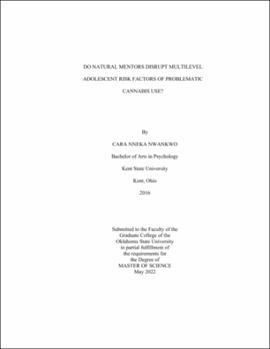| dc.description.abstract | There are multilevel factors during adolescence that may contribute to problematic cannabis use; it is crucial to identify these factors and factors that may buffer problematic use. The present study investigated if adolescent risk factors across systems are associated with lifetime history of problematic cannabis use and investigated if having a natural mentor was a protective and/or compensatory factor against problematic use. Individuals from the National Longitudinal Study of Adolescent to Adult Health (Add Health) study were included in the present study (N=2,153). Adolescent risk factors assessed at Wave I (neighborhood poverty and drug exposure, access to illegal drugs at home, peer cannabis use, and delinquency); natural mentorship was assessed at Wave III. Lifetime history of problematic cannabis use was assessed at Wave IV. The main effects of risk factors and natural mentorship on problematic cannabis use were investigated; and the moderating role of natural mentorship on the association between risk factors and problematic cannabis use. Analyses were initially completed with the full sample; additional analyses were conducted on two subsamples: Black and White individuals. Results of the model using the full sample are described first. Those with access to drugs at home were less likely to have a history of problematic use (B=-.812,p=.029). An interaction between access to drugs at home and mentorship emerged (B=.844,p=.038). Follow-up probing indicated for those with no mentor, having access to drugs at home was not related to a history of problematic use (OR=.222,p=.148). Among those with a mentor, having access to drugs at home during was associated with a greater likelihood of having a history of problematic use (OR=1.062,p< .001). Among Black individuals, the peer use*mentorship interaction (B=-.402,p =.056) was marginally significant. Among Black individuals with no mentor, exposure to peer use was associated with an increased likelihood of problematic use (OR=1.448,p=.009). On the other hand, among Black individuals with a mentor, exposure to peer use was associated with a decreased likelihood of problematic use in adulthood (OR=0.636,p<.001). No significant predictors or interactions were present for White individuals. Our findings suggest that natural mentorship may be beneficial in some contexts for Black individuals. | |
